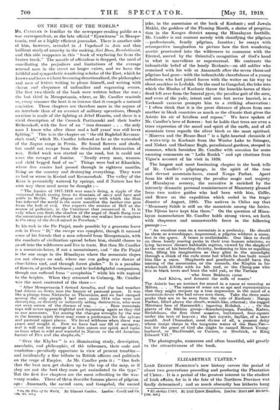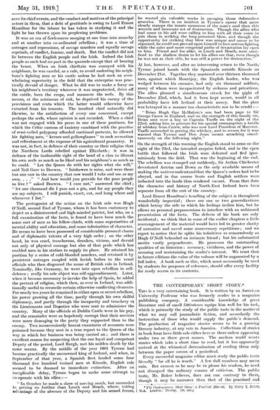ELIZABETHAN ULSTER.* LORD ERNEST HAMILTON'S new history covers the period
of about two generations preceding and producing the Plantation of Ulster.: It is a period of the greatest interest to the student of Irish affairs, for in it the fate of the Northern Province was finally determined ; and so much obscurity has hitherto hung
* Elizahrl Ann UOVii. By Lord Ernest Hamilton. London; Hurst and pleekett. Rea. seta "
over its chief events, and the conduct and motives of the principal actors in them, that a debt of gratitude is owing to Lord Ernest Hamilton for the labour he has taken in studying it and the light he has thrown %ion its perplexing problems.
It was an era of lawlessness merging at one time into anarchy and at another into co-ordinated rebellion ; it was a time of outrages and repressions, of savage murders and equally savage reprisals, of conflict, famine, and death. But the conflict did not lie between the English people and the Irish. Indeed the Irish people as such had no part in the quarrels except that of bearing the brunt. When an Irish chieftain was annoyed with his neighbour, he was careful, an a rule, to avoid molesting his neigh- bour's fighting men or his castle unless he had such an over- whelming superiority in the field that the enterprise was prac- tically devoid of danger. What he did was to make a foray on his neighbour's territory wherever it was unprotected, drive off the cattle, burn the crops, and massacre the serfs. By this means, at the minimum of risk, he deprived his enemy of the provisions and rents which the latter would otherwise have extorted from his tenants. The insulted chief naturally did likewise, to the satisfaction of every one concerned, except perhaps the serfs, whose opinion is not recorded. When a chief was not engaged with his peers in one of these pastimes, for which the Celtic custom of tanistry combined with the, practice of semi-veiled polygamy afforded continual pretexts, he allowed his fighting men, " kernes and gallowglasses " to seek recreation and refreshment at the expense of his agricultural peasantry. It was not, in fact, in defence of their country or their religion that the Northern Lords rebelled against Elizabeth ; it was in defence of the inalienable right of the head of a clan to illtreat his own serfs as much as he liked and his neighbour's as much as he could. " Let the Queen do with her rights what she will," said Neil Gary to Docwrs. " Inishowen is mine, and were there but one cow in the country that cow would I take and use as my own. . . ." " And how would you provide for the poor people to live ? " asked Docwra. " I care not," answered the chief ; "let one thousand die I pass not a pin, and for my people they are my subjects. I will punish, exact, cut, and hang where and whenever I list."
The protagonist of the action on the Irish side was Hugh O'Neill, second Earl of Tyrone, whom it has been customary to depict as a disinterested and high-minded patriot, but who, on a full examination of the facts, is found to have been much the same sort of man as his fellow-chiefs, with some superiorities of mental ability and education, and some inferiorities of character. He seems to have been possessed of considerable personal charm and of diplomatic talents of a very high order ; on the other hand, he was cruel, treacherous, drunken, vicious, and devoid not only of physical courage but also of that pride which has enabled men in his station to supply its place. He attained his position by a series of cold-blooded murders, and retained it by persistent outrages coupled with lavish bribes to the venal officials who then disgraced the name of British rule in Ireland. Nominally, like Germany, he went into open rebellion in self- defence ; really his sole object was self-aggrandisement. Later, when it became necessary to invoke the help of Spain, he added the pretext of religion, which then, as ever in Ireland, was addi- tionally useful to reconcile certain otherwise conflicting elements. For nearly ten years he remained in either open or secret rebellion, his power growing all the time, partly through his own skilful diplomacy, and partly through the incapacity and treachery of the Lieutenants and Deputies who were sent to administer the country. Many of the officials at Dublin Castle were in his pay, and the remainder were so hopelessly corrupt that their services were more damaging to the party they supported than to the enemy. Two inconveniently honest examiners of accounts were poisoned because they sent in a true report to the Queen of the way in which her business was being carried on ; and them is excellent reason for suspecting that the one loyal and competent Deputy of the period, Lord Burgh, met his sudden death by the same means. By the middle of the year 16011 Tyrone had become practically the uncrowned king of Ireland, and when, in September of that year, a Spanish fleet landed some four thousand five hundred trained men at Kinsale, English rule seemed to be doomed to immediate extinction. After an inexplicable delay, Tyrone began to make some attempt to co-operate with his allies :—
" In October he made a show of moving south, but succeeded in getting no further than Louth and Meath, where, taking
advantage of the absence of the Deputy and his armed forces,
he wasted six valuable weeks in ravaging those defenceless
counties. There is no incident in Tyrone's career that more clearly stamps the innate meanness of the man's soul than this
wanton and insensate act of destruction. Though the allies who had come to his aid were calling to him with all their voice to join them in striking the long-promised blow, and though the
opportunity for striking that blow was unique and never to be repeated, he could not prevail upon himself to face serious fighting while the safer and more congenial paths of devastation lay open to him. Friend and foe alike, in Louth and Meath, were sacri- ficed to the shallow desire to let his allies see that, even though he was not at their side, he was still a power for destruction."
At last, however, and after an intervening return to the North,' Tyrone joined hands with the Spaniards outside Kinsale on December 21st. Together they mustered over thirteen thousand men, against which Mountjoy, the English leader, who was wedged between his enemies, had only six thousand soldiers, many of whom were incapacitated by sickness and privations. The allies planned a simultaneous attack for the night of December 23rd, which, had it been kept secret, would in all probability have left Ireland at their mercy. But the plan was betrayed in a manner too characteristic not to be retold :— " Brian Hugh Oge McMahon's son had been page to Sir George Carew in England, and on the strength of this family tie. Brian sent over a boy to Captain Taaffe on the night of the 22nd, asking him to procure for his special consumption a bottle of whiskey from Carew, who was now Lord President of Munster. Taaffe succeeded in getting the whiskey, and in return for it was warned that Tyrone and Don Juan meant attacking simul- taneously on the following night."
On the strength of this warning the English stood to arms on the night of the 23rd, the intended surprise failed, and in the open battle that followed the Irish were defeated and fled igno- miniously from the field. That was the beginning of the end. The rebellion was stamped out ruthlessly, Sir Arthur Chichester devastated Antrim and Down as the only available means of making the natives understand that the Queen's orders had to be obeyed, and in due course Scots and English settlers were inducted into the lands thus rendered vacant. Front that date the character and history of North-East Ireland have been separate from all the rest of the country.
Lord Ernest Hamilton's handling of the subject is throughout wonderfully impartial ; there are one or two generalizations which betray the side to which his feelings incline him, but Ito allows no personal prepossessions to interfere with an unbiassed presentation of the facts. The defects of his book are only incidental ; we think that in some of the earlier chapters a little rearrangement of the material would have led to greater clarity of narrative and saved some unnecessary repetitions ; and we regret to notice that he splits his infinitives as remorselessly as Hugh O'Neill beheaded an intimate friend ; but his substantial merits vastly preponderate. He possesses the outstanding qualities of an historian : accuracy, vividness, and the power of arousing and maintaining the reader's interest. We trust that in future editions the value of the volume will be augmented by a full index. A book such as this, which must necessarily be used by students for purposes of reference, should offer every facility for ready access to its contents.



































 Previous page
Previous page